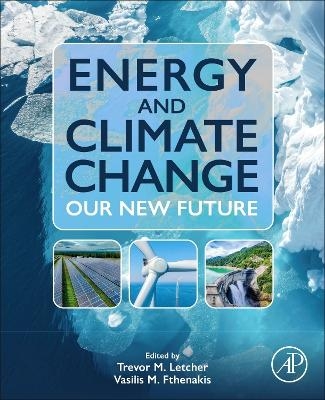
Energy and Climate Change
Academic Press Inc (Verlag)
978-0-443-21927-6 (ISBN)
- Noch nicht erschienen (ca. Februar 2025)
- Versandkostenfrei innerhalb Deutschlands
- Auch auf Rechnung
- Verfügbarkeit in der Filiale vor Ort prüfen
- Artikel merken
Professor Trevor Letcher is an Emeritus Professor at the University of KwaZulu-Natal, South Africa, and living in the United Kingdom. He was previously Professor of Chemistry, and Head of Department, at the University of the Witwatersrand, Rhodes University, and Natal, in South Africa (1969-2004). He has published over 300 papers on areas such as chemical thermodynamic and waste from landfill in peer reviewed journals, and 100 papers in popular science and education journals. Prof. Letcher has edited and/or written 32 major books, of which 22 were published by Elsevier, on topics ranging from future energy, climate change, storing energy, waste, tyre waste and recycling, wind energy, solar energy, managing global warming, plastic waste, renewable energy, and environmental disasters. He has been awarded gold medals by the South African Institute of Chemistry and the South African Association for the Advancement of Science, and the Journal of Chemical Thermodynamics honoured him with a Festschrift in 2018. He is a life member of both the Royal Society of Chemistry (London) and the South African Institute of Chemistry. He is on the editorial board of the Journal of Chemical Thermodynamics, and is a Director of the Board of the International Association of Chemical Thermodynamics since 2002. Vasilis Fthenakis is the Founding Director of the Center for Life Cycle Analysis (CLCA), Adjunct Professor in the Department of Earth and Environmental Engineering and the Department of Electrical Engineering at Columbia University and Distinguished Scientist Emeritus at Brookhaven National Laboratory. Fthenakis is internationally recognized for his leading work in the energy-environment nexus and renewable energy grid integration. With a focus on developing methodologies, models, and tools to analyze cleaner energy alternatives, he has been a pioneer in studying the environmental impact, resource availability and recycling of photovoltaics (PVs), accelerating their commercial adoption around the world. More recently, he broadened the CLCA’s research to explore solar-enabled water desalination and “green hydrogen production. He is a Fellow of the American Institute of Chemical Engineers (AIChE), a Fellow of the Institute of Electrical and Electronic Engineers (IEEE) and a recipient of several honors and awards including the 2022 Karl Boer Solar Energy Medal of Merit for “distinguished contributions to quest for sustainable energy.
A. INTRODUCTION
1. Evidence and Causes of Climate Change
2. The Need to Reduce Carbon Dioxide Production and Boost Renewable Energy
3. Evidence of Climate Change (Intertidal Indicators)
4. Evidence of Climate Change (Bird Ecology)
5. Global Surface Temperatures
B. FOSSIL FUELS
6. Oil and Natural Gas, Present and in the Future
7. Coal and Climate Change
C. RENEWABLE ENERGY and STORING ENERGY
8. Wind Energy: Status and Outlook
9. Solar Photovoltaics: Status and Outlook
10. Concentrating Solar Technologies: Status and Outlook
11. An Uncertain Future for Global Hydropower
12. Geothermal Energy: Status and Outlook
13. Marine Energy: Status and Perspectives
14. Tidal Energy: Status and Perspectives
15. Storing Energy: Options to Balance Renewable Energy and Strengthen the Grid
16. Hydrogen Production and Hydrogen as an Energy Vector
17. Solid Air Hydrogen Liquefaction, the Missing Link of the Hydrogen Economy
D. NUCLEAR ENERGY
18. Nuclear Fission: Safety, Impact on the Environment and Potential in 2030 and 2050
19. Small Modular Reactors: Economic, Safety and Environmental Aspects
E. CARBON CAPTURE AND POTENTIAL NEW ENERGY TECHNOLOGIES
20. Carbon Capture and Sequestration: A critical view of its future
21. Nuclear Fusion: Safety, Impact on the Environment and Potential in 2030 and 2050
22. Space Based Solar Energy
F. FINAL WORD
23. The Transition to 100 Percent Clean Renewable Energy
| Erscheint lt. Verlag | 1.2.2025 |
|---|---|
| Verlagsort | San Diego |
| Sprache | englisch |
| Maße | 191 x 235 mm |
| Themenwelt | Technik ► Elektrotechnik / Energietechnik |
| Weitere Fachgebiete ► Land- / Forstwirtschaft / Fischerei | |
| ISBN-10 | 0-443-21927-3 / 0443219273 |
| ISBN-13 | 978-0-443-21927-6 / 9780443219276 |
| Zustand | Neuware |
| Informationen gemäß Produktsicherheitsverordnung (GPSR) | |
| Haben Sie eine Frage zum Produkt? |
aus dem Bereich


